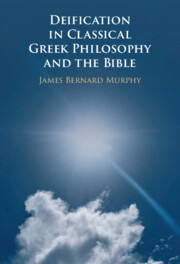Book contents
- Deification in Classical Greek Philosophy and the Bible
- Deification in Classical Greek Philosophy and the Bible
- Copyright page
- Dedication
- Epigraph
- Contents
- Introduction
- Chapter 1 Theology as Anthropology, Anthropology as Theology
- Chapter 2 Heroic Deification in Ancient Greek Religion
- Chapter 3 Ironic Deification in Socrates
- Chapter 4 Civic Deification in Plato
- Chapter 5 Developmental Deification in Aristotle
- Chapter 6 Deification as Intimacy with God in the Bible
- Conclusion
- Acknowledgments
- Select Bibliography
- Index
Introduction
Why Better Implies Best
Published online by Cambridge University Press: 10 July 2024
- Deification in Classical Greek Philosophy and the Bible
- Deification in Classical Greek Philosophy and the Bible
- Copyright page
- Dedication
- Epigraph
- Contents
- Introduction
- Chapter 1 Theology as Anthropology, Anthropology as Theology
- Chapter 2 Heroic Deification in Ancient Greek Religion
- Chapter 3 Ironic Deification in Socrates
- Chapter 4 Civic Deification in Plato
- Chapter 5 Developmental Deification in Aristotle
- Chapter 6 Deification as Intimacy with God in the Bible
- Conclusion
- Acknowledgments
- Select Bibliography
- Index
Summary
To be human is to want to be better– if not a better person, then at least better at something. The first premise of this book is that we cannot strive to become better without some notion of the best; logically speaking, better implies best. The second premise is that the idea of the divine serves as the limit case of what is best in our practical reasoning; it is a conceptual truth about god that nothing better can be conceived. The third premise is that our ideas about the gods are an invaluable window on human nature. I then set out my principles for the interpretation of the Socratic philosophers and the Bible. Finally, I discuss the existing scholarship about “becoming like a god” in Greek philosophy and how I see this book in relation to it.
Keywords
- Type
- Chapter
- Information
- Publisher: Cambridge University PressPrint publication year: 2024

